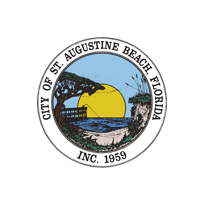
What Is an Illicit Discharge?
Chapter 7 of the City Code (available at here) defines an illicit discharge as:
"A discharge to the city's storm sewer system or to waters of the United States which is not composed entirely of stormwater, unless exempted pursuant to this regulation, and/or the discharge to the city's storm sewer system or to waters of the United States and which is not in compliance with federal, state and city permits."
Why do We Need to Identify and Report Illicit Discharges?
The National Pollutant Discharge Elimination System (NPDES) permit program was created in 1972 by the Clean Water Act (CWA) and helps address water pollution by regulating sources of pollution to waters of the United States. The City of St. Augustine Beach is a Municipal Separate Storm Sewer System (MS4) permitted under Phase II of the NPDES program. In order to comply with our permit, the City must must establish regulations prohibiting illicit discharges into the MS4 and provide sufficient means to monitor and enforce local discharge regulations. In 2008, the City adopted Ordinance 2008-31 addressing illicit discharge.
What Types of Things Are Not Allowed?
In addition to obvious pollutants such as oils, antifreeze and chemicals, many normal household activities can cause an illicit discharge. Dumping yard waste, draining chlorinated swimming pool water and household waste water from washing machines, dishwashers or water softening devices into ditches, storm drains and canals are also classified as illicit discharges. Even sweeping grass clippings into a storm drain is an illicit discharge. The City's ditches and pipes eventually make their way to one of the surrounding water bodies (i.e. the Matanzas River, Salt Run or the Atlantic Ocean). Even if there is no direct connection to a ditch or pipe, contaminates discharged on the ground can make their way through the groundwater and contaminate the receiving water bodies.
What to Do if I see an Illicit Discharge
It is imperative that illicit discharges be detected, reported and corrected as early as possible to minimize harm to the environment. If you see or suspect illegal dumping or illicit discharges into the City's drainage system, please call the Public Works Department (904) 471-1119 or email public-works [at] cityofsab.org. If possible, tell the dispatcher what is being dumped, the time of the day, the location of the illicit dumping and (if applicable) a license plate number of the vehicle or trailer involved. You may also download and fill out an Illicit Discharge Report Form from this page and email it to public-works [at] cityofsab.org. Please include in the email subject line the words " POTENTIAL ILLICIT DISCHARGE" and the closest address to the observed condition. Public Works will promptly investigate the matter to determine if an Illicit discharge is occurring and facilitate corrective action if warranted.
More Information
More information on the NPDES program can be found at the U.S. Environmental Protection Agency webpage at:
Information related to stormwater discharge from construction activities is available at:
https://www.epa.gov/npdes/stormwater-discharges-construction-activities
HELPFUL LINKS:
Have a concern or request regarding City operations? Click here.
Have a question regarding stormwater management and City's National Pollutant Discharge Elimination System (NPDES) Program? Click here.







